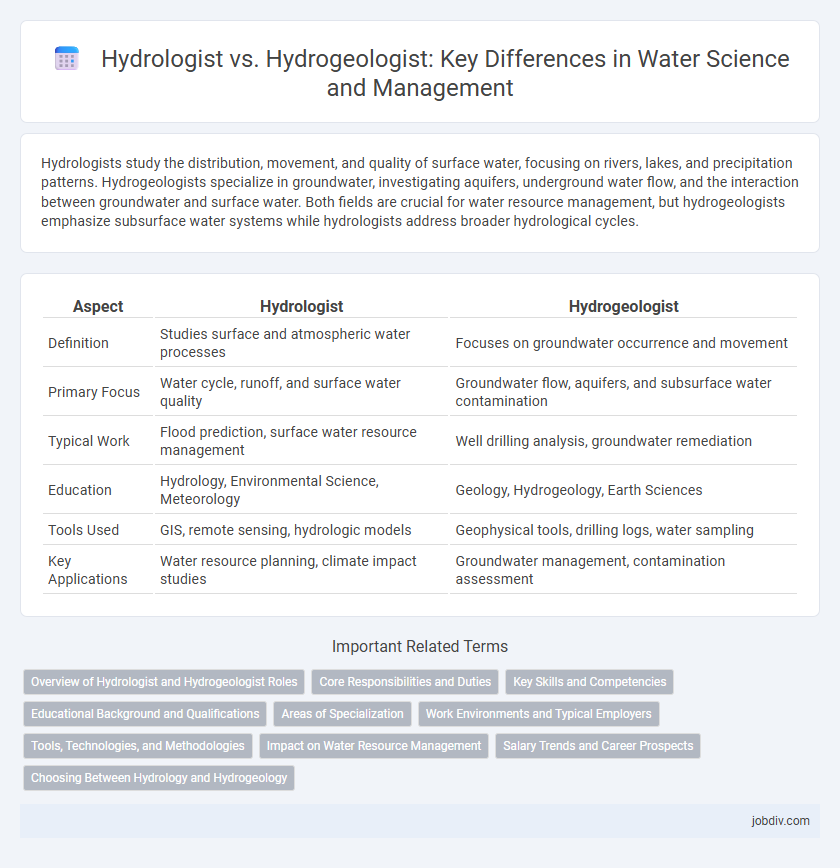Hydrologists study the distribution, movement, and quality of surface water, focusing on rivers, lakes, and precipitation patterns. Hydrogeologists specialize in groundwater, investigating aquifers, underground water flow, and the interaction between groundwater and surface water. Both fields are crucial for water resource management, but hydrogeologists emphasize subsurface water systems while hydrologists address broader hydrological cycles.
Table of Comparison
| Aspect | Hydrologist | Hydrogeologist |
|---|---|---|
| Definition | Studies surface and atmospheric water processes | Focuses on groundwater occurrence and movement |
| Primary Focus | Water cycle, runoff, and surface water quality | Groundwater flow, aquifers, and subsurface water contamination |
| Typical Work | Flood prediction, surface water resource management | Well drilling analysis, groundwater remediation |
| Education | Hydrology, Environmental Science, Meteorology | Geology, Hydrogeology, Earth Sciences |
| Tools Used | GIS, remote sensing, hydrologic models | Geophysical tools, drilling logs, water sampling |
| Key Applications | Water resource planning, climate impact studies | Groundwater management, contamination assessment |
Overview of Hydrologist and Hydrogeologist Roles
Hydrologists analyze surface water distribution, movement, and quality to address environmental and resource management challenges. Hydrogeologists specialize in groundwater systems, investigating aquifer properties, recharge rates, and contaminant transport to ensure sustainable water supply. Both professions use geospatial data and modeling tools to support water resource planning and environmental protection.
Core Responsibilities and Duties
Hydrologists analyze surface water processes such as rainfall, river flow, and watershed management to understand water distribution and quality in the environment. Hydrogeologists specialize in studying groundwater movement, aquifer properties, and subsurface water contamination to manage sustainable water supplies and assess pollution risks. Both professionals collaborate on water resource assessments but focus distinctly on surface versus underground water systems.
Key Skills and Competencies
Hydrologists analyze surface water systems, requiring expertise in meteorology, data modeling, and watershed management, while hydrogeologists specialize in groundwater, emphasizing skills in geology, aquifer testing, and contaminant transport. Both professions demand strong analytical abilities, proficiency in GIS software, and knowledge of environmental regulations to assess and manage water resources effectively. Understanding hydrogeological mapping and water quality assessment is critical for hydrogeologists, whereas hydrologists focus more on flood prediction and surface water hydrodynamics.
Educational Background and Qualifications
Hydrologists typically hold degrees in hydrology, environmental science, or civil engineering, emphasizing surface water systems, watershed management, and meteorology. Hydrogeologists require specialized education in geology or earth sciences, focusing on groundwater flow, aquifer properties, and subsurface contamination, often holding advanced degrees in hydrogeology or geological engineering. Professional certifications such as Professional Hydrologist (PH) or Registered Professional Geologist (RPG) enhance credibility in their respective fields.
Areas of Specialization
Hydrologists specialize in surface water processes, including rainfall, river flow, and watershed management, analyzing how water interacts with the atmosphere and ecosystems. Hydrogeologists focus on groundwater, studying aquifer properties, subsurface water movement, and contamination risks. Both experts use advanced modeling techniques but apply them to different components of the water cycle to support sustainable water resource management.
Work Environments and Typical Employers
Hydrologists commonly work in government agencies like the US Geological Survey, environmental consulting firms, and research institutions focusing on surface water and watershed management. Hydrogeologists are typically employed by environmental engineering firms, mining companies, and water resource management agencies, specializing in groundwater studies and aquifer analysis. Both professions often collaborate with regulatory bodies and use fieldwork and laboratory settings to analyze water quality and availability.
Tools, Technologies, and Methodologies
Hydrologists utilize remote sensing technologies, Geographic Information Systems (GIS), and hydrological modeling software to analyze surface water dynamics and precipitation patterns. Hydrogeologists specialize in groundwater investigation using tools such as borehole drilling equipment, geophysical surveys, and groundwater flow models like MODFLOW. Methodologies for hydrologists include watershed analysis and flood forecasting, while hydrogeologists focus on aquifer characterization and groundwater contamination assessment.
Impact on Water Resource Management
Hydrologists analyze surface water processes such as rainfall, river flow, and watershed dynamics to optimize water allocation and flood control strategies. Hydrogeologists specialize in groundwater flow regulation, contamination assessment, and aquifer recharge, critical for sustainable groundwater management and pollution prevention. Both disciplines provide essential data to inform policies that balance water availability, quality, and ecosystem health in integrated water resource management.
Salary Trends and Career Prospects
Hydrologists typically analyze surface water and focus on water cycle processes, earning an average salary ranging from $60,000 to $90,000 per year, with growth driven by environmental monitoring and climate impact studies. Hydrogeologists specialize in groundwater resources, often commanding higher salaries between $70,000 and $100,000 due to their expertise in water resource management, contamination assessment, and regulatory compliance. Both careers show strong prospects as demand rises for sustainable water solutions and infrastructure development amid increasing concerns over water scarcity and pollution.
Choosing Between Hydrology and Hydrogeology
Hydrologists primarily study the movement, distribution, and quality of surface water in rivers, lakes, and atmospheric systems, while hydrogeologists focus on groundwater flow, aquifer properties, and subsurface water resources. Choosing between hydrology and hydrogeology depends on interest in surface versus underground water processes, with hydrologists often involved in flood prediction and watershed management, and hydrogeologists specializing in groundwater contamination and aquifer sustainability. Both fields require strong skills in geology, physics, and data analysis, but hydrogeology demands more expertise in subsurface geology and hydrochemical modeling.
Hydrologist vs Hydrogeologist Infographic

 jobdiv.com
jobdiv.com